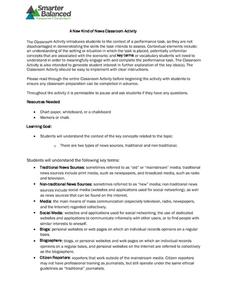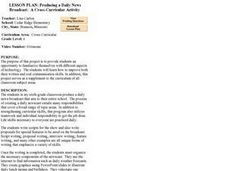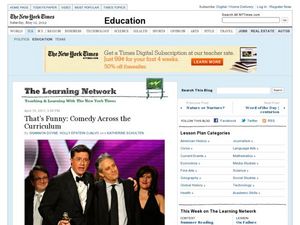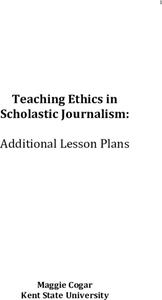Smarter Balanced
A New Kind of News
Newspapers and broadcast news. Social media, blogs, and blogospheres. Class members generate a list of news sources they use to get information about events. The big idea here is to introduce the necessary vocabulary and to establish a...
Curated OER
Producing a Daily News Broadcast: A Cross-Curricular Activity
Sixth graders create a daily newscast which they broadcast to the whole school. They write the scripts for the broadcast, after reviewing interviews, feature writing, and proposals. They organize the newscast for presentation and edit...
Curated OER
Broadcasting the News Lesson 6
Students practice news reading at three words per second. They produce a news program while working as a team of reporters. They watch news clips of current reporters making a list of news reading tips. They play an online game that...
Curated OER
Current Events
Students research current events and simulate a newscast of a current news story. They watch the evening news and write a summary of a story of interest, conduct Internet research and complete a worksheet on a current event, and...
Curated OER
Our Savage Planet in the News
Students research volcanoes, storms, atmospheric conditions and extreme environments. They collect information and create a simulation of a science newscast. They watch a video and write a letter as an eyewitness to an avalanche.
Curated OER
Digesting the News
Students explore the editorial concepts, site designs and business models of online news digests. They propose detailed plans for Web sites that demonstrate their own areas of expertise.
National History Day
“War Is Hell. We Know it Now.” American Soldiers in the Meuse-Argonne Offensive
Understanding the soldier's experiences during World War I sometimes takes a newscast. Learners see the importance of understanding multiple points of view with a newscast project surrounding the Meuse-Argonne Offensive. Compare and...
PBS
Finding Story Ideas
Pitch your best news story to your news team, or the peers in your journalism class, with a lesson about finding, reporting, and presenting a story. After watching clips of different examples, as well as strategies for finding the best...
Social Media Toolbox
Reporting with Social Media
What does it take to create news stories that are both informative and objective? Aspiring journalists walk the line between engagement and activism with lesson 15 of a 16-part series titled The Social Media Toolbox. Grouped pupils...
Curated OER
War and the Media Press Freedom vs. Military Censorship
Learners analyze the relationship between war and media. In this media awareness instructional activity, students listen to their instructor present a lecture on freedom of the press and military censorship. Learners participate in an...
Curated OER
News Anchor
Students view selected clips from news programs, analyzing the volume, stress and pacing of the deliverance. They prepare and deliver a one-minute presentation based on a current news story.
Curated OER
Comedy Across the Curriculum
The New York Times Learning Network provides the resources that permit pupils to examine and then write and perform a fake news broadcast in the vein of “The Daily Show” or “Saturday Night Live” Weekend Update. The generated reports...
Newseum
Bias Through History: Analyzing Historical Sources
Young journalists use the E.S.C.A.P.E. (evidence, source, context, audience, purpose, and execution) strategy to evaluate historical and contemporary examples of bias in the news. The class then uses the provided discussion questions to...
Crabtree Publishing
Why Does Media Literacy Matter?
Criticism of news and entertainment journalism is at an all-time high. Help 21st-century learners develop the media literacy skills they need to become critical consumers with a three-lesson guide the looks at persuasive techniques used...
Franklin D. Roosevelt Presidential Library & Museum
Pearl Harbor Activity #5: The Medium Matters
Young journalists learn that how we get our news and information matters in a collaborative social studies activity. The class is divided into three groups with the first analyzing a transcript of FDR's "Day of Infamy" speech, the second...
Facebook
Versions of Media Texts
Verification of provenance and the original source of an image or video can be a long and winding process. Young journalists learn about the difficulty of finding the original source of a scrape, a copy of an original news story, and...
Media Smarts
Bias
See how bias operates firsthand. Half of the class reads one article while the other half reads another article on the same event. The obvious differences emerge when the two sides talk about their observations though. Several handouts...
Curated OER
Shaping the News
Students explore television journalism. In this journalism activity, students discuss the attributes of television broadcasting. Students then review their journalism code of ethics and then conduct research for stories that have a moral...
Curated OER
Producing a Daily News Broadcast: A Cross-Curricular Activity
Sixth graders create the daily news for their school.
Curated OER
Staying Informed
Students identify the various ways the American public can stay informed on the news. In groups, they brainstorm reasons why the public should not stick to one source for their news. They use this information to examine their own current...
Facing History and Ourselves
Hands Up, Don't Shoot!
Why is it so difficult to develop a clear understanding of the events surrounding the shooting of Michael Brown by a Ferguson, Missouri, police officer? To answer this question class members listen to a NPR discussion of the findings of...
The New York Times
Stress Less: Understanding How Your Mind and Body Respond to Anxiety
What could be more relevant to teens and preteens than experiencing stress? Use an article from the New York Times website to practice valuable Common Core skills for informational text reading, and also get a discussion going in your...
PBS
Decoding Media Bias
Alternative facts? After watching the We The Voters film, "MediOcracy," viewers compare how cable news outlets CNN, Fox News, and MSNBC report the same story about politics or public policy. After a whole-class discussion of their...
Kent State University
Teaching Ethics in Scholastic Journalism
Events in recent years have underscored the importance of a free and independent press in a democracy. Young journalists engage in lessons about the function of journalism in a democratic society, practice the steps of Bok's Ethical...
Other popular searches
- Newscasts
- Broadcast a Newscasts
- Newscasts From the Past
- Writing Newscasts
- Community Newscasts
- Write a Newscasts
- Sports Newscasts
- Weather Newscasting Script
- Civil War Newscasts
- Newscasts on Civil War
- Newscasting
- Performing Newscasts

























